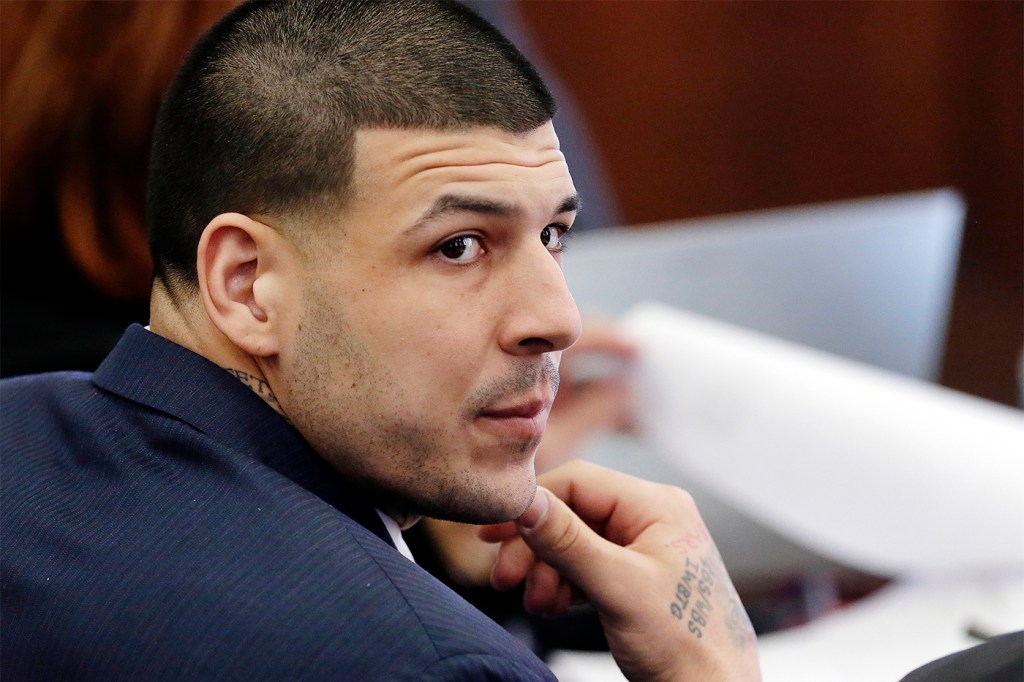What happened to Aaron Hernandez? New series, experts examine NFL star’s troubled upbringing, CTE diagnosis
“American Sports Story” explores Hernandez’s traumatic family life and football career, both of which may have contributed to his violent behavior.

Before he was convicted of murder in 2015, Aaron Hernandez was a star tight end for the New England Patriots. But his athletic success was marred by troubles that began in his childhood.
“American Sports Story: Aaron Hernandez,” an FX network production series by Ryan Murphy that premiered this week, explores Hernandez’s life and how he ended up serving time in prison for murder before dying by suicide in 2017.
The series is based on a podcast from The Boston Globe that looked at the NFL star’s life and death, including his post-mortem diagnosis of chronic traumatic encephalopathy and early-life trauma.
Hernandez’s troubled upbringing and CTE diagnosis might have affected his behavior, experts say.
Heather Brenhouse, a psychology professor at Northeastern University, says childhood traumas can increase one’s risk for mental illness, especially if they don’t receive the proper support for processing these experiences.
“If somebody’s gone through something, that does not mean their fate is sealed,” Brenhouse says. “We find that even when children undergo a pretty substantial trauma, if they have a parent or caretaker that’s there who is nurturing and supporting the child, that is a huge buffer … (but) we’ve seen the most detrimental traumas are those that involve an unstable, neglectful or abusive relationship with a caretaker.”


Hernandez’s early life
The first two episodes of the series, which aired this week, touched upon Hernandez’s early life. Hernandez’s father was allegedly abusive and died when the football star was a teenager. Hernandez’s mother went on to date his older cousin’s husband, whom Hernandez moved in with. Hernandez reportedly used marijuana, drank and became involved in criminal activity in high school.
Hernandez was a star playing football for the University of Florida; however, there were academic issues and drug use, and his coach said after his junior year that he would not be welcomed back. His professional success was quickly marred by legal issues. He often got into fights when out partying, had rage issues, and was eventually charged with three murders and several assault counts.
Featured Posts
Without developing skills to process and cope, people can be more at risk for developing mood disorders like depression, Brenhouse says. People who experienced early trauma might also simply have trouble processing when they’re in a situation where they’re actually being threatened and have violence outbursts as a result, she adds.
“One of the growing theories is that the processes in the brain that are most heavily affected by early life adversity are those that are responsive to threat,” Brenhouse says. “Everything about your brain and your body that’s trying to decide what is threatening … seem to be really heavily impacted. … Even individuals who haven’t been diagnosed with any kind of disorder but who have experienced early life trauma still (find it) to be pretty hard to figure out what’s safe. Your idea of what is safe and what might be a threat might be different if you were exposed to an early life trauma.”
CTE can affect one’s behavior
Hernandez had CTE, which can affect one’s behavior. CTE is a neurodegenerative disease characterized by a buildup of tau proteins in the supporting cells of the brain, says Timothy Morris, an assistant professor at Northeastern who specializes in traumatic brain injuries. The disease has been associated with people who’ve taken repeated blows to the head. This includes hits that don’t necessarily result in a concussion.
“We see it across professional athletes,” Morris adds. “Those who have the highest exposure are soccer players and American football players. They have more exposure to these kinds of impacts than your Sunday league player. … There’s clearly a direct exposure link between playing professional contact sports and the risk of CTE.”
The researcher who looked at Hernandez’s brain said it was some of “the worst CTE” she’d seen in someone that young.
CTE can manifest in emotional regulation and behavioral deficits, Morris says. This can include shifts in personality and a lack of inhibitions. It’s possible, Morris adds, that this is something Hernandez experienced as the disease set in and affected his actions.
“Everybody’s behavior is influenced by early experiences, genetics, all these things,” Brenhouse says. “We are a product of all of those things.That doesn’t mean that we’re allowed to behave any way we want. Murder and violence are egregiously bad decisions … (trauma) is not an excuse. But I think understanding how these people become this way is what we need to know in order to prevent this from happening.”











